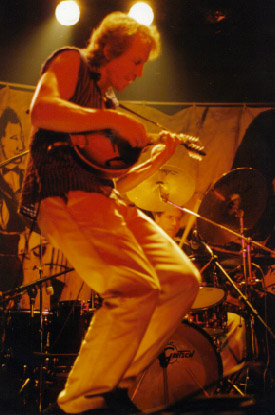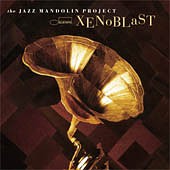

A
FIRESIDE CHAT WITH JAMIE MASEFIELD OF THE JAZZ MANDOLIN PROJECT
Record companies are constantly concocting schemes to cater to younger
audiences. I would imagine that there are candles burning late into the
night with an army of A&R persons trying to come up with the next hip
thing that will capture the ears of Generation X listeners. But, to their
credit, Gen Xers seem to see right through those formulatic themes and
instead clamor to musicians that are keeping it real. Musicians like Jamie
Masefield of the Jazz Mandolin Project, who stays true to the music and
that honesty is what keeps the lines forming at the doors of the venues
the JMP perform in. I sat down with Masefield to talk about his roots,
his music, and the ever-growing interest of Gen X in improvised music.
Of course, I bring it to you, unedited and in his own words.
FRED JUNG: Let's start from the beginning.
JAMIE MASEFIELD: I started playing music when I was about eleven and I
started with the tenor banjo. There was music going on at family functions
that was primarily traditional New Orleans music and old swing tunes and
so I wanted a tenor banjo and started my musical foundation with old jazz
tunes. Then when I got to the University of Vermont, I started playing
with more people my own age. The mandolin is tuned similarily to the tenor
banjo. So I started picking that up and found that it was a little more
compatible with the types of music that my peers were playing. Then my
interests in jazz developed in a way that I started wanting to get into
more contemporary styles. In a technical sense, I have been greatly influenced
by modern jazz guitarists rather than mandolin players. I am an oddball
in the mandolin world in that I don't have a bluegrass background and
a lot of my approach is based on a tenor banjo approach.
FJ: Who were some of the jazz guitarists you were listening to?
JAMIE MASEFIELD: Jim Hall and John Scofield and Pat Metheny. Mike Stern
and a Brazilian guitarist named Toninho Horta and Bill Frisell. Wes Montgomery
too, but I kind of got really excited about what people were doing right
now. I wondered what I could do on my instrument to get a little closer
to that sound that sounded so good to me.
FJ: I am curious as to why you didn't simply switch to playing guitar.
JAMIE MASEFIELD: I'm not on a mission to show how great the mandolin is
in the world of jazz. It is simply just the instrument that I could play.
Those are the tools that I had available and so that's what I'm working
with.
FJ: Mandolin and jazz are not an obvious pairing, was it difficult to
initially get people to warm up to the idea?
JAMIE MASEFIELD: Yeah, and the way that I started this was I was playing
in a handful of bands in the area and none of them were really satisfying
my drive. What I really wanted to do was play jazz on the mandolin. So
I started booking one date a month at a volunteer run coffee house in
town that was just barely getting by and tried to find any jazz musicians
who would play with me basically for free with the context that we're
just going to get together and jam and play what we want to play and not
really worry about proper quiet things. We were a bit out there. It was
very adventuresome music. People really started coming in and checking
it out, young people, college students and because it was my only gig,
doing this thing that I really loved, I made sure that it happened every
month. I used that as a monthly deadline to write new tunes or maybe even
rehearse with somebody in town that I was going to do it with and so that
is how it started.
FJ: There are periods of that kind of heightened selfless creativity in
jazz.
JAMIE MASEFIELD: Well, that was just at the time when people were starting
to tape shows and write about groups on the internet and after about a
year, every gig that we would play, there would be two or three people
setting up these mic stands in front of us and talking about us on the
internet. It started to grow in a very grassroots, underground way.
FJ: Doing things through the underground gives you a legitimacy because
of the cult-like loyalty of the underground.
JAMIE MASEFIELD: It was very impressive because when we started hitting
the road, our major tour that we did was Madison, Wisconsin and back,
a college student contacted by email and said, "I will book a tour to
my college, where I will have a gig for you." I thought, "Yeah, right.
Nobody knows us out there." And it wasn't a great tour, but it was a tour
and when we got to Chicago and Madison, I was bowled over because there
were actually people who were really excited that we were coming to town
and they knew and I just thought, "We're in Chicago." And I just couldn't
believe that through this word of mouth network, people already had tapes
of us, live shows and they already knew some of our tunes and they couldn't
wait to hear the sound live. It was very exciting.
FJ: What do you find gratifying about playing jazz?
JAMIE MASEFIELD: I love the sense of exploring. It makes me feel very
free. I think of it like going for a walk outside and just going to whatever
place interests you, whether you want to turn over a stone or cross a
stream or whatever, there is just a great sense of freedom and exploring
that when you are playing with other guys who you have developed a vocabulary
with, then you are all kind of exploring together and it's a real illuminating
experience.
FJ: Let's touch on those players, who makes up the personnel of The Jazz
Mandolin Project?
JAMIE MASEFIELD: Well, it turned out to be a rotating cast of characters,
simply because we are on the road so much that it is hard to expect any
person to dedicate so much of their time to this one thing. There have
been several people who have kind of been doing it with me and that has
been a wonderful experience.
FJ: Who is on The Jazz Mandolin Project's Blue Note debut, Xenoblast?
JAMIE MASEFIELD: The people who are on the new CD, coming out in May,
are Chris Dahlgren on upright bass and Ari Hoenig on drums. We toured
all of '99 together and really developed a unique sound. We recorded the
album in two days in the middle of a tour. When the CD comes out in May,
we will be doing quite a bit of touring, celebrating the CD. And then
there are other musicians. Danton Boller is playing upright bass with
me.
FJ: Danton is a fine bass player.
JAMIE MASEFIELD: Yeah, how do you know Danton?
FJ: In a past life, Danton lived in LA.
JAMIE MASEFIELD: Right, awesome, yeah. Are you in LA?
FJ: I am.
JAMIE MASEFIELD: Wow, that is so cool. So Danton has been just fitting
in wonderfully. He just did a tour with me where I had the drummer of
Phish and we all had a blast. So those are the guys that I'm playing with
now and they always seem to be living in Brooklyn.
FJ: You are a touring band.
JAMIE MASEFIELD: Yeah, we tour heavy all the time. We worked quite hard
at getting some great showcase gigs. We are playing two nights at the
Montreal Jazz Festival. We're playing a big gig at the New Orleans Jazz
Festival. We're doing the Bell Atlantic Jazz Festival in DC and Philly.
We're playing in Central Park. There are a lot of things going on that
are really exciting.
Fred Jung is Jazz Weekly's Editor-In-Chief and defender of the free world.
Comments? Email
Fred.
